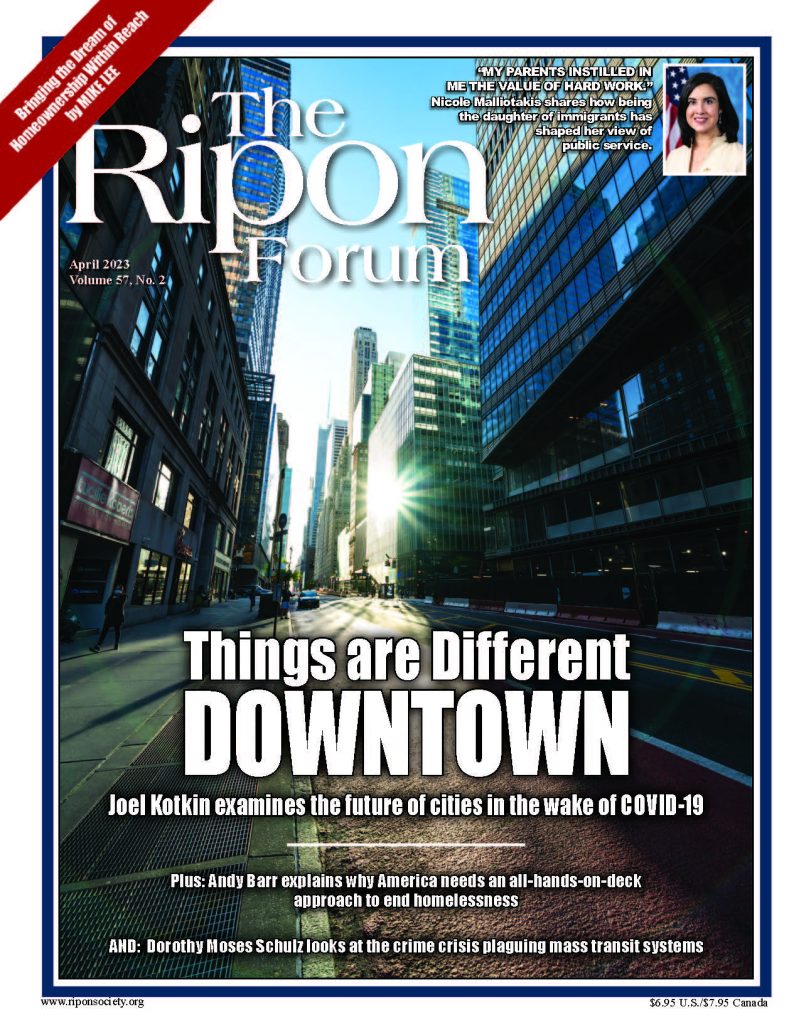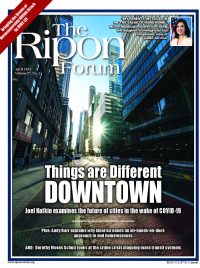 WASHINGTON, DC — With violent crime continuing to escalate and office occupancy rates not yet returning to pre-pandemic levels, the latest edition of The Ripon Forum examines the future of American cities in the wake of COVID-19 and the fact that — from the number of people on the street to the number of businesses that have been forced to close — things look different downtown.
WASHINGTON, DC — With violent crime continuing to escalate and office occupancy rates not yet returning to pre-pandemic levels, the latest edition of The Ripon Forum examines the future of American cities in the wake of COVID-19 and the fact that — from the number of people on the street to the number of businesses that have been forced to close — things look different downtown.
“We are entering a new urban epoch,” writes Joel Kotkin in the lead essay for the latest edition, “with the potential to disrupt city life in ways not unlike that created in the shift from an industrial to what Jean Gottman described in 1983 as the ‘transactional city.’ Kotkin is an author and presidential fellow who serves as executive director of the Urban Reform Institute. In his essay, he points out that while COVID helped fuel these changes, the reality is that they have been a long time coming.
“Migration to dense cities, already a small share of all moves, started to decline as early as 2015. But it accelerated during the pandemic,” he writes. “The pandemic clearly accelerated a devastating rise in crime and lawlessness … In some parts of Chicago and Philadelphia, young men now have a greater chance of being killed by firearms than the American soldiers who served during the wars in Afghanistan and Iraq.”
Calling these developments “a mounting crisis for urban governance,” Kotkin says that cities need to change — and the changes need to start at the top. “Clearly, current urban leadership needs to change,” he writes. “The key challenge lies with restoring or at least maintaining the stable middle or working class constituencies that elected the last crop of effective reformers.”
Another challenge that must be addressed as part of any urban turnaround is homelessness. According to U.S. Rep. Andy Barr, addressing this challenge will require not only an “all-hands-on-deck” approach, but a recognition that the current U.S. policy to end homelessness called Housing First has failed. “Housing First has failed because it prevents providers who require wraparound services from receiving federal funds to curb homelessness in our communities,” Barr writes. “These wraparound services are oftentimes necessary to ensuring a person can safely and fully attain permanent housing on their own. We need to abandon HUD’s exclusive reliance on Housing First in order to truly help those in our communities. We need an all-hands-on-deck approach to reduce homelessness.”
According to professor and retired police captain Dorothy Moses Schulz, cities also need to address the lawlessness on mass transit systems. “The United States has more violent attacks on transit systems than any other economically advanced nation in the world,” she writes. “Many of these attacks are committed by ‘non-destination riders’ [who] enter stations and board trains without paying fares, often jumping turnstiles in front of transit officials who are effectively powerless to stop them because city officials have decided fare evasion is no longer a crime. Minor crimes such as trespassing and vandalism are also not being prosecuted.”
Preventing these minor crimes, Schulz advises, is a good way of preventing more serious offenses, and an approach that has been proven to work. “Cracking down on people who evade fares and jump turnstiles is a necessary step,” she writes. “Some might argue it is the 2023 equivalent of ‘Broken Windows,’ the approach to policing that helped reduce violent crime in New York City in the 1990s and is based around a very simple and powerful premise — namely, stopping minor crimes prevents major lawlessness.”
In other essays, U.S. Sen. Mike Lee discusses the innovative plan he has authored to bring the dream of homeownership back within reach by building more homes on federal land. U.S. Rep. Dan Newhouse discusses his role as a member of the House Select Committee on China and the importance of countering the Chinese threat. U.S. Rep. Dusty Johnson provides an update on the effort he is leading to strengthen America’s supply chain. With another tax day upon us, Daniel Bunn of the Tax Foundation examines the progressivity of America’s tax system.
In our debate feature, Lisa Dailey of the Treatment Advocacy Center and Deborah DeSantis of the Corporation for Supportive Housing provide two views of the plan put forth by New York City Mayor Eric Adams to hospitalize mentally ill homeless individuals without their consent. And in our latest Ripon Profile, U.S. Rep. Nicole Malliotakis discusses, among other topics, how being the daughter of immigrants shapes her approach to public service.
As always, we hope you enjoy this latest edition of The Ripon Forum, and encourage you to contact us with any questions or comments you may have.
Lou Zickar
Editor of The Ripon Forum
louzickar@clu.ccw.mybluehost.me




